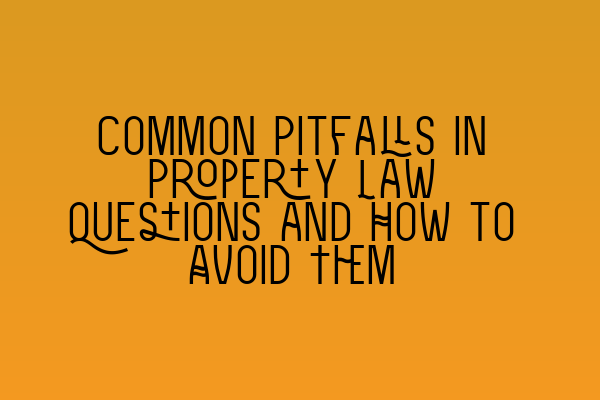Common Pitfalls in Property Law Questions and How to Avoid Them
Welcome to the blog of SQE Property Law & Land Law, where we provide expert advice and insights into property law matters. In today’s post, we will be discussing some common pitfalls that students and practitioners often encounter when dealing with property law questions and how to avoid them. Whether you are preparing for your SQE exams or seeking to enhance your knowledge in property law, this article will be beneficial for you.
1. Insufficient Understanding of Basic Concepts
One common pitfall is having an inadequate understanding of the fundamental concepts in property law. It is essential to grasp the basic principles, such as the difference between real and personal property, the various types of estates, and the concept of adverse possession. Without a strong foundation in these concepts, answering property law questions accurately becomes challenging.
To overcome this pitfall, we recommend taking SQE 1 Practice Exam Questions to test your knowledge and identify areas where you need to improve. Additionally, our SQE 1 Preparation Courses offer comprehensive materials and resources to help you master the foundational concepts of property law.
2. Failure to Analyze the Facts
Another common mistake is not thoroughly analyzing the facts provided in the question. Property law questions often involve complex scenarios with multiple parties and legal issues. Failing to carefully consider all the relevant information can lead to incorrect answers.
When faced with a property law question, take your time to read and understand the facts. Break down the scenario into its essential elements and identify the key legal issues involved. Consider all perspectives and apply the relevant legal principles to the facts provided. This analytical approach will significantly enhance your chances of providing accurate answers.
3. Neglecting to Consider Statutory Provisions
Property law is heavily influenced by legislation, and failing to consider applicable statutes can be a critical mistake. Many property law questions require you to apply specific provisions from acts such as the Law of Property Act 1925 or the Land Registration Act 2002.
Ensure that you are familiar with the relevant statutory provisions and, where necessary, refer to them in your answers. It is also essential to stay updated with any recent changes or developments in property law legislation, as they may have a direct impact on your analysis.
To stay informed, consider enrolling in our SQE 2 Preparation Courses, which cover the latest developments in property law legislation and provide in-depth explanations of the statutory provisions.
4. Lack of Case Law Knowledge
Property law is not solely based on statutes; it also heavily relies on case law. Understanding landmark cases and their application to different property law scenarios is crucial for success in property law questions.
Take the time to familiarize yourself with key property law cases, such as Pye v. Graham [2002] and Street v. Mountford [1985]. Be able to identify the relevant principles established in these cases and apply them to similar fact patterns. By incorporating relevant case law into your answers, you will demonstrate a deeper understanding of property law and significantly improve your chances of success.
5. Poor Time Management
Time management is vital when answering property law questions. Many students and practitioners struggle with allocating the appropriate amount of time to each question, resulting in rushed answers and incomplete analysis.
Developing efficient time management skills is essential for success in property law exams. Practice timed mock exams, such as our SQE 1 Practice Mocks FLK1 FLK2, to improve your ability to manage time effectively. By simulating exam conditions and adhering to strict time limits, you can enhance your speed and accuracy in answering property law questions.
In Conclusion
Property law questions can be complex and challenging, but with proper preparation and understanding, you can avoid common pitfalls and achieve success. Ensure you have a solid grasp on the fundamental concepts, analyze the facts thoroughly, consider statutory provisions and case law, and manage your time effectively.
If you are preparing for the SQE exams, our SQE 1 Preparation Courses and SQE 2 Preparation Courses provide comprehensive materials and practice resources to help you excel in property law and other areas of legal knowledge.
Thank you for reading our blog post on common pitfalls in property law questions and how to avoid them. For more helpful resources and information, be sure to check out our related articles:
- SQE 1 Practice Exam Questions
- SQE 1 Practice Mocks FLK1 FLK2
- SQE 2 Preparation Courses
- SQE 1 Preparation Courses
- SRA SQE Exam Dates
Stay tuned for more informative blog posts from SQE Property Law & Land Law!
